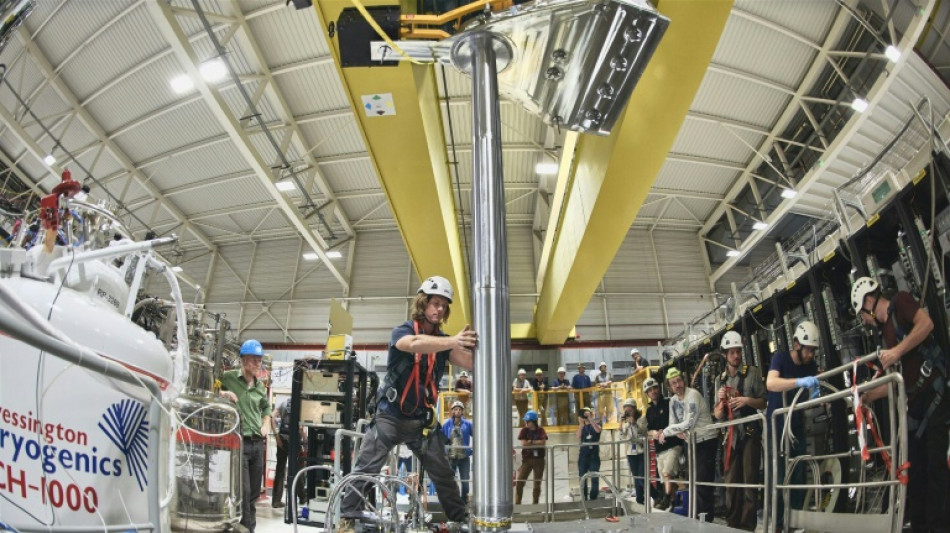
-
 From the Andes to Darfur: Colombians lured to Sudan's killing fields
From the Andes to Darfur: Colombians lured to Sudan's killing fields
-
Eagles win division as Commanders clash descends into brawl

-
 US again seizes oil tanker off coast of Venezuela
US again seizes oil tanker off coast of Venezuela
-
New Zealand 35-0, lead by 190, after racing through West Indies tail

-
 West Indies 420 all out to trail New Zealand by 155
West Indies 420 all out to trail New Zealand by 155
-
Arteta tells leaders Arsenal to 'learn' while winning

-
 Honour to match idol Ronaldo's Real Madrid calendar year goal record: Mbappe
Honour to match idol Ronaldo's Real Madrid calendar year goal record: Mbappe
-
Dupont helps Toulouse bounce back in Top 14 after turbulent week

-
 Mbappe matches Ronaldo record as Real Madrid beat Sevilla
Mbappe matches Ronaldo record as Real Madrid beat Sevilla
-
Gyokeres ends drought to gift Arsenal top spot for Christmas

-
 Arsenal stay top despite Man City win, Liverpool beat nine-man Spurs
Arsenal stay top despite Man City win, Liverpool beat nine-man Spurs
-
US intercepts oil tanker off coast of Venezuela

-
 PSG cruise past fifth-tier Fontenay in French Cup
PSG cruise past fifth-tier Fontenay in French Cup
-
Isak injury leaves Slot counting cost of Liverpool win at Spurs

-
 Juve beat Roma to close in on Serie A leaders Inter
Juve beat Roma to close in on Serie A leaders Inter
-
US intercepts oil tanker off coast of Venezuela: US media

-
 Haaland sends Man City top, Liverpool beat nine-man Spurs
Haaland sends Man City top, Liverpool beat nine-man Spurs
-
Epstein victims, lawmakers criticize partial release and redactions
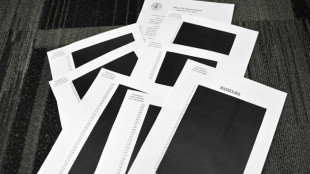
-
 Leverkusen beat Leipzig to move third in Bundesliga
Leverkusen beat Leipzig to move third in Bundesliga
-
Lakers guard Smart fined $35,000 for swearing at refs

-
 Liverpool sink nine-man Spurs but Isak limps off after rare goal
Liverpool sink nine-man Spurs but Isak limps off after rare goal
-
Guardiola urges Man City to 'improve' after dispatching West Ham

-
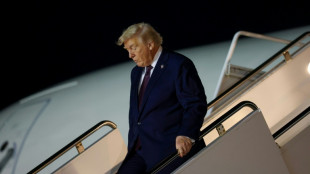 Syria monitor says US strikes killed at least five IS members
Syria monitor says US strikes killed at least five IS members
-
Australia stops in silence for Bondi Beach shooting victims

-
 Olympic champion Joseph helps Perpignan to first Top 14 win despite red card
Olympic champion Joseph helps Perpignan to first Top 14 win despite red card
-
Zelensky says US mooted direct Ukraine-Russia talks on ending war

-
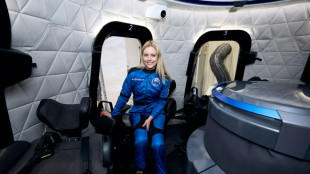 Wheelchair user flies into space, a first
Wheelchair user flies into space, a first
-
Brazil's Lula, Argentina's Milei clash over Venezuela at Mercosur summit
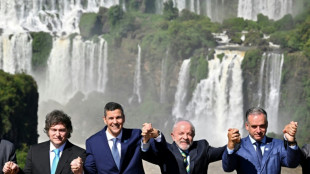
-
 Haaland sends Man City top, Chelsea fightback frustrates Newcastle
Haaland sends Man City top, Chelsea fightback frustrates Newcastle
-
Thailand on top at SEA Games clouded by border conflict

-
 Chelsea chaos not a distraction for Maresca
Chelsea chaos not a distraction for Maresca
-
Brazil's Lula asks EU to show 'courage' and sign Mercosur trade deal
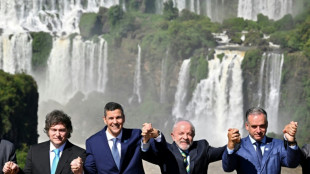
-
 Africa Cup of Nations to be held every four years after 2028 edition
Africa Cup of Nations to be held every four years after 2028 edition
-
Zelensky says US mooted direct Ukraine-Russia talks on ending war in Miami

-
 Armed conflict in Venezuela would be 'humanitarian catastrophe': Lula
Armed conflict in Venezuela would be 'humanitarian catastrophe': Lula
-
Chelsea fightback in Newcastle draw eases pressure on Maresca

-
 FIFA Best XI 'a joke' rages Flick over Raphinha snub
FIFA Best XI 'a joke' rages Flick over Raphinha snub
-
Swiss Von Allmen pips Odermatt to Val Gardena downhill

-
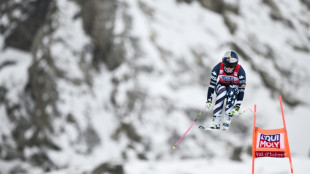 Vonn claims third podium of the season at Val d'Isere
Vonn claims third podium of the season at Val d'Isere
-
India drops Shubman Gill from T20 World Cup squad

-
 Tens of thousands attend funeral of killed Bangladesh student leader
Tens of thousands attend funeral of killed Bangladesh student leader
-
England 'flat' as Crawley admits Australia a better side
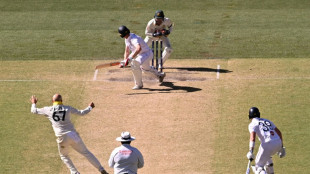
-
 Australia four wickets from Ashes glory as England cling on
Australia four wickets from Ashes glory as England cling on
-
Beetles block mining of Europe's biggest rare earths deposit
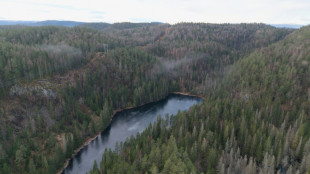
-
 French culture boss accused of mass drinks spiking to humiliate women
French culture boss accused of mass drinks spiking to humiliate women
-
Burning effigy, bamboo crafts at once-a-decade Hong Kong festival

-
 Joshua knocks out Paul to win Netflix boxing bout
Joshua knocks out Paul to win Netflix boxing bout
-
Dogged Hodge ton sees West Indies save follow-on against New Zealand

-
 England dig in as they chase a record 435 to keep Ashes alive
England dig in as they chase a record 435 to keep Ashes alive
-
Wembanyama 26-point bench cameo takes Spurs to Hawks win


Mysterious antimatter observed falling down for first time
For the first time, scientists have observed antimatter particles -- the mysterious twins of the visible matter all around us -- falling downwards due to the effect of gravity, Europe's physics lab CERN announced on Wednesday.
The experiment was hailed as "huge milestone", though most physicists anticipated the result, and it had been predicted by Einstein's 1915 theory of relativity.
It definitively rules out that gravity repels antimatter upwards -- a finding that would have upended our fundamental understanding of the universe.
Around 13.8 billion years ago, the Big Bang is believed to have produced an equal amount of matter -- what everything you can see is made out of -- and antimatter, its equal yet opposite counterpart.
However there is virtually no antimatter in the universe, which prompted one of the greatest mysteries of physics: what happened to all the antimatter?
"Half the universe is missing," said Jeffrey Hangst, a member of CERN's ALPHA collaboration in Geneva which conducted the new experiment.
"In principle, we could build a universe -- everything that we know about -- with only antimatter, and it would work in exactly the same way," he told AFP.
Physicists believe that matter and antimatter did meet and almost entirely destroyed each other after the Big Bang.
Yet matter now makes up nearly five percent of the universe -- the rest is even less understood dark matter and dark energy -- while antimatter vanished.
- Newton's apple flying up? -
One of the key outstanding questions about antimatter was whether gravity caused it to fall in the same way as normal matter.
While most physicists believed that it did, a few had speculated otherwise.
A falling apple famously inspired Isaac Newton's work on gravity -- but if that apple was made of antimatter, would it have shot up into the sky?
And if gravity did in fact repel antimatter, it could have meant that impossibilities such as a perpetual motion machine were possible.
"So why not drop some and see what happens?" Hangst said.
He compared the experiment to Galileo's famous -- though likely apocryphal -- 16th-century demonstration that two balls of different mass dropped from the Leaning Tower of Pisa would fall at the same rate.
But this experiment -- the result of 30 years of work on antimatter at CERN -- was "a little bit more involved" than Galileo's, Hangst said.
One problem was that antimatter barely exists outside of rare, short-lived particles in outer space.
However in 1996, CERN scientists produced the first atoms of antimatter -- antihydrogen.
Another challenge was that, because matter and antimatter have an opposite electrical charge, the moment they meet they destroy each other in a violent flash of energy scientists call annihilation.
- A magnetic trap -
To study gravity's effect on antimatter, the ALPHA team constructed a 25-centimetre-long (10-inch) bottle placed on its end, with magnets at the top and bottom.
Late last year, the scientists placed around 100 very cold antihydrogen atoms into this "magnetic trap" called ALPHA-g.
As they turned down the strength of both magnets, the antihydrogen particles -- which were bouncing around at 100 metres a second -- were able to escape out either end of the bottle.
The scientists then simply counted how much antimatter was annihilated at each end of the bottle.
Around 80 percent of the antihydrogen went out of the bottom, which is a similar rate to how regular bouncing hydrogen atoms would behave if they were in the bottle.
This result, published in the journal Nature, shows that gravity causes antimatter to fall downwards, as predicted by Einstein's 1915 theory of relativity.
In more than a dozen experiments, the CERN scientists varied the strength of the magnets, observing gravity's effect on antimatter at different rates.
While the experiment rules out that gravity makes antihydrogen go upwards, Hangst emphasised it did not prove that antimatter behaves in exactly the same way as normal matter.
"That's our next task," he said.
Marco Gersabeck, a physicist who works at CERN but was not involved in the ALPHA research, said it was "a huge milestone".
But it marks "only the start of an era" of more precise measurements of gravity's effect on antimatter, he told AFP.
Other attempts to better understand antimatter include using CERN's Large Hadron Collider to investigate strange particles called beauty quarks.
And there is an experiment onboard the International Space Station trying to catch antimatter in cosmic rays.
But for now, exactly why the universe is awash with matter but devoid of antimatter "remains a mystery," said physicist Harry Cliff.
Since both should have annihilated each other completely in the early universe, "the fact that we exist suggests there is something we don't understand" going on, he added.
B.Finley--AMWN



